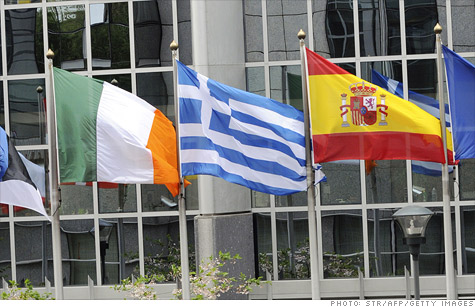
The chances of Greece leaving the eurozone are rising, but it won't be disruptive.
NEW YORK (CNNMoney) -- The results of the latest elections in Greece may make it more likely that the country will eventually leave the eurozone. But such an exit would probably be more orderly than Greece's default, experts said.
Over the weekend, Greece was unable to pull together a cohesive government, as voters signaled their displeasure with the spate of harsh austerity measures thrust upon them.
That has increased the odds of a Greek exit from the eurozone. According to Citigroup (C, Fortune 500) analysts, the probability of a Greek exit, which they dubbed a "Grexit," is now as high as 75%.
Citi analysts said the election results highlighted the sharpest drop in public support for mainstream parties in decades and "underscores rising public opposition against austerity."
It also may throw into question the next round of bailout funding from the IMF, European Central Bank and European Union. More than €31 billion is slated to be disbursed during the quarter. If Greece fails to make progress, the so-called troika may withhold the money and Greece would run out of funding, say the analysts.
That could set the conditions for a eurozone exit in motion.
"[Greece] is not going to get pushed, but they might walk out," Citi chief economist Willem Buiter said at last week's Milken Institute Global Conference.
If Greece leaves the eurozone, presumably the drachma currency would make a comeback. That could prove to be a boon for the nation. Tourism could see a resurgence, especially if the exchange rates are favorable, and wages could be revived, boosting overall consumer spending.
Economist Nouriel Roubini thinks Portugal and Ireland may also find themselves restructuring their debt and could even wind up following Greece out the door, but none of that should prove disruptive to world markets.
"If a small country -- like Greece or Portugal -- exit, you can have an orderly divorce, but if that restructuring and/or exit hits Italy or Spain, effectively you could get a breakup of the eurozone," Roubini said. But he added that's an unlikely scenario.
Much of how things shake out will also depend on policy makers, who want to move forward in a constructive manner.
"It has been a bad idea to bet against policy makers ever since the fall of Lehman," said Brevan Howard chief U.S. economist Jason Cummins. "You have to believe policy makers are working for the best intentions."
He noted that policymakers played a key role in the United States' bank bailouts, "fostering conditions so we could recover." And in Europe, he pointed to the ECB's long-term refinancing operations, or LTROs, as having helped European banks get their footing.
"Over the coming years, we should be prepared for the idea that policy makers will eventually do the right thing though it won't always be a smooth path," Cummins said.
And default is becoming a less scary scenario for some. "Greece defaulted and we're still here," said Cummins. "It's not the end of life on earth as we know it."
Most agreed that the eurozone could look quite different in a year's time.
"The eurozone will not fall apart," said UBS managing director Josef Stadler, at last week's conference. "Two or three countries may leave the eurozone but not the entire 17."
Stadler even said France and Germany could revisit the idea of eurobonds, a common debt security for all members of the eurozone.
Germany has been against the idea because even though it would drive down rates in troubled sovereign nations, Germany's rates would potentially skyrocket. But Stadler sees it as the ultimate endgame to bring rates under control, particularly as borrowing costs for sovereign nations remain stubbornly high.
Beyond Greece, worries about Italy, which also dominated the latter part of 2011, have been trumped by Spain. Even though Spain has a lower amount of public debt as a percentage of GDP than other troubled European countries, Spain suffers from higher unemployment, more housing problems and weakening market confidence.
Pimco Chief Executive Mohamed El-Erian said he thinks the eurozone will hold together, "but it might be smaller."
At last week's conference, El-Erian told CNNMoney that he thinks the eurozone will emerge stronger over the next three to five years. "A lot of that has to do with Spain. But the good news is Spain is not Greece." ![]()
| Index | Last | Change | % Change |
|---|---|---|---|
| Dow | 32,627.97 | -234.33 | -0.71% |
| Nasdaq | 13,215.24 | 99.07 | 0.76% |
| S&P 500 | 3,913.10 | -2.36 | -0.06% |
| Treasuries | 1.73 | 0.00 | 0.12% |
| Company | Price | Change | % Change |
|---|---|---|---|
| Ford Motor Co | 8.29 | 0.05 | 0.61% |
| Advanced Micro Devic... | 54.59 | 0.70 | 1.30% |
| Cisco Systems Inc | 47.49 | -2.44 | -4.89% |
| General Electric Co | 13.00 | -0.16 | -1.22% |
| Kraft Heinz Co | 27.84 | -2.20 | -7.32% |
| Overnight Avg Rate | Latest | Change | Last Week |
|---|---|---|---|
| 30 yr fixed | 3.80% | 3.88% | |
| 15 yr fixed | 3.20% | 3.23% | |
| 5/1 ARM | 3.84% | 3.88% | |
| 30 yr refi | 3.82% | 3.93% | |
| 15 yr refi | 3.20% | 3.23% |
Today's featured rates: